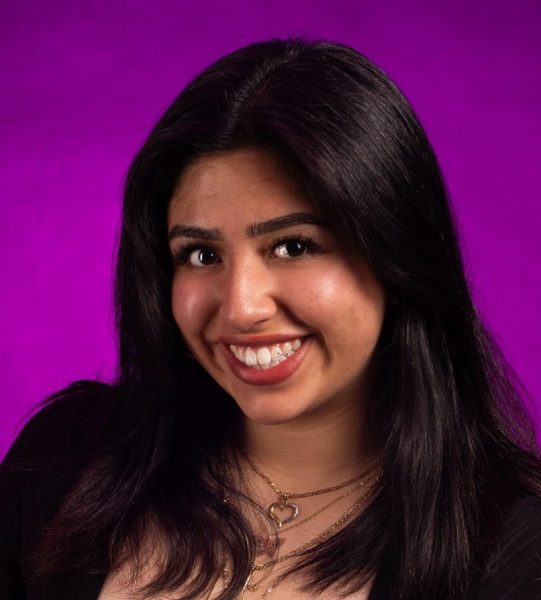
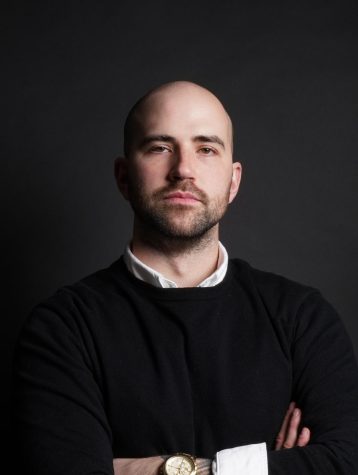
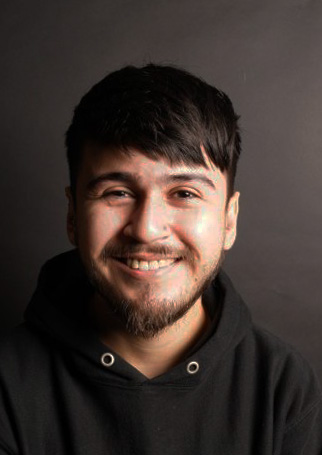
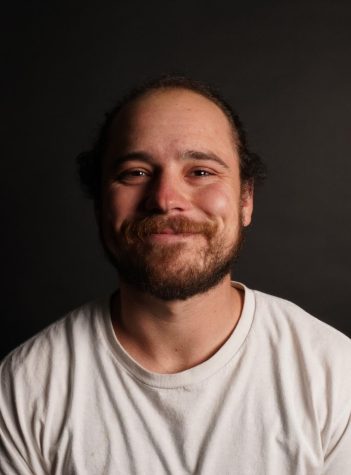
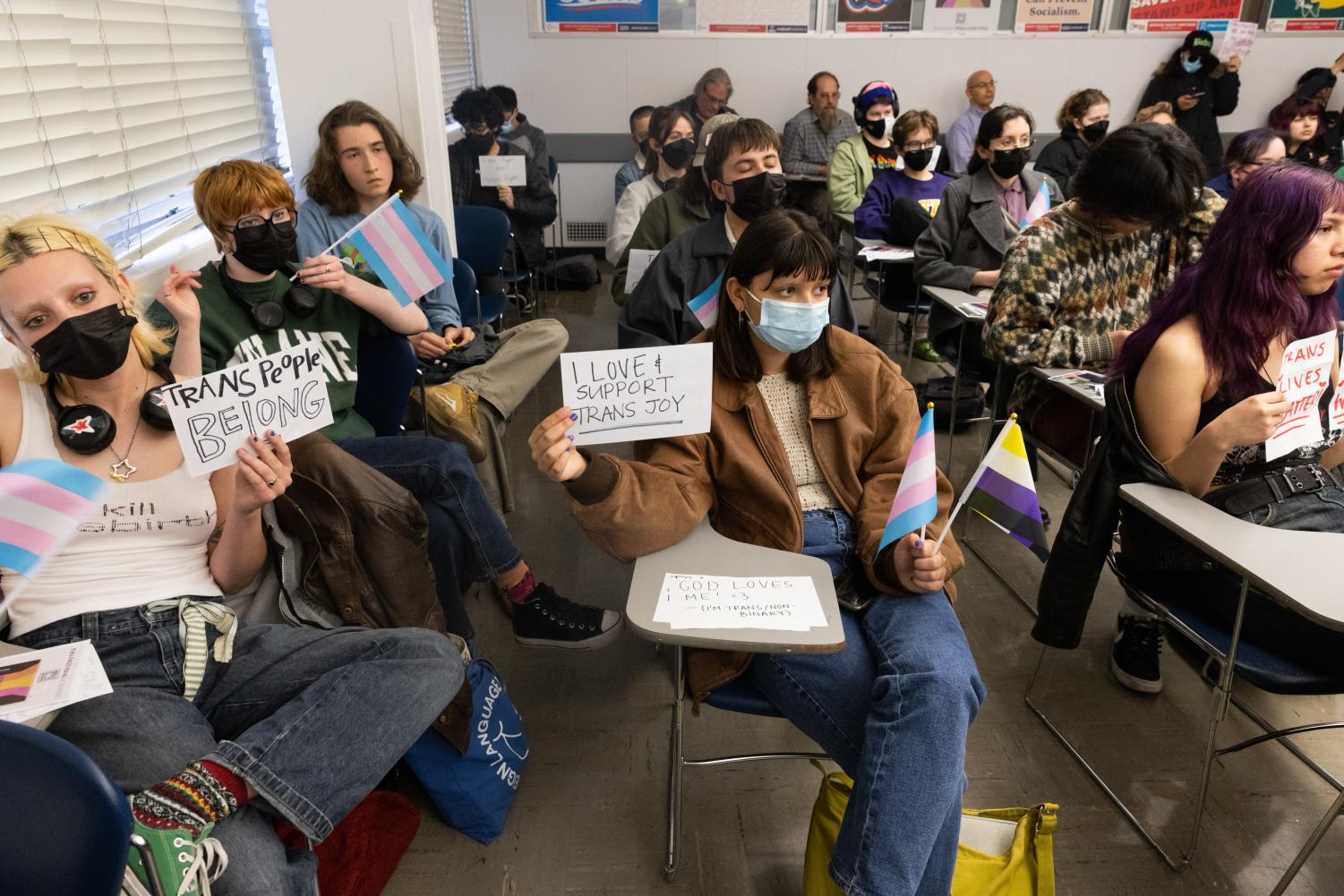

Trans-rights activists filled the Turning Point USA event, igniting hours of sit-in protesting inside and outside.
Apr 7, 2023
SF State’s chapter of Turning Point USA, a conservative non-profit organization, hosted “Saving Women’s Sports with Riley Gaines” on Thursday to a host of protests. Gaines is a former collegiate swimmer and activist advocating for the National Collegiate Athletics Association to exclude transgender athletes from participating in collegiate sports with cisgender athletes.
Gaines first spoke out about cisgender women competing with trans athletes after the former University of Kentucky swimmer tied for fifth place with Lia Thomas, a transgender athlete, during the 200-meter NCAA championship in March 2022. Since then, Gaines has been “bringing awareness to female equality in sports” by spreading anti-trans messaging, stating that “it is unfair for biological males to compete against biological females,” according to her official website.
TPUSA at SF State was founded this spring by broadcast and electronic arts student Navid Mehdipour. Gaines is the first speaker TPUSA brought to campus.
“I am here alongside leadership and students of Turning Point USA to talk about my experience in competing at the collegiate level against a biological male,” Gaines said during an interview before the event. “What that looked like as athletes, what we’re continuing to face and how we can all move forward to find a solution that will appease the majority of people.”
Gaines is aware of the backlash toward her presence at SF State but claims it is an important conversation to have. According to Director of Athletics Stephanie Shrieve-Hawkins, there are currently no trans athletes at SF State.
“It’s not just about a sports piece, but it’s about getting our voices out there because up until this point, everyone wants to silence me,” Gaines said.
Gaines said she is here not only to speak about her experience as an athlete, but also for her teammates at the University of Kentucky and those who competed with her at the NCAA championships.
“People have been trying to silence my voice but I’m not willing to be silent because I see what’s at stake here,” Gaines said.
SF State alumni, Al Nicotta, saw the event post and organized a sit-in protest to “oppose the transphobic speaker” according to his 24-hour Instagram story post.
“I was openly trans on campus and got resources to transition on campus,” Nicotta said. “I saw them using the freedom card for an event like this to attempt to take away the freedoms of people, which is not how freedom of speech works.”
The event brought a mixed crowd of students, alumni and protesters. The group opposing the event outnumbered TPUSA’s supporters at least 2-to-1 in HSS Building Room 310, where the max capacity is 75 people.
“Most people don’t agree and we need to let them know that their views on how people are living their lives is not tolerated,” Nicotta said.
Nicotta’s sit-in protest was also accompanied by the Queer & Trans Sports Mixer hosted by AS Queer and Trans Resource Center, which took place an hour before the TPUSA event.
“Being trans is not an ideology, it’s a state of being,” Nicotta said. “Being trans on [SF] State’s campus is not going to be something that is going to be vilified or criminalized by any form of government or student body at all. And those views are not welcome.”
Gaines anticipated backlash before the event.
“The backlash does not bother me. I welcome everyone,” Gaines said. “I encourage everyone to come. I encourage people with opposing views than myself to come because I think it’s important that these people who don’t agree with me, at least are willing to hear my perspective being someone who was directly impacted by this.”
Gaines stated that she was open to having a civil conversation and that it’s not enough to talk just to those who agree with her stance. A large part of her efforts is dedicated to reaching those who are moderate.
“I want people to feel comfortable asking tough questions because I’m comfortable answering them,” Gaines said. “So I encourage everyone of all perspectives and views to come.”
By 6:54 p.m. the room was at maximum capacity and the remaining protesters waited outside, chanting “trans women are women” and “trans rights are under attack, what do we do? Stand up and fight back.”
SF State student Dani Luna, a second-year student, was one of the protesters denied entry.
“I’ve seen her speak out against transgender swimmer athlete Lia Thomas,” Luna said. “There’s been a whole debate around transgender sports. I feel like if you participate in sports, it promotes sportsmanship. I don’t believe in completely excluding anyone.”
Luna has mixed feelings toward the event.
“I think that they’re trying to bring their messaging and their activism here,” Luna said. “Women’s sports have undergone a few issues. I just want to get more information or like to hear more stories on that side.”
Protesters were joined by others who found the event through Instagram.
“I’m just going to show up for my community and I don’t want to react to her because that’s not what we’re trying to get across,” said Rabbit May, who doesn’t have any connection to the school. “I want her to look in the audience and see a bunch of trans people.”
During the event, students were only allowed to enter the room as others left.
Venus Harvey, a second-year SF State student, was able to enter the room where the event was held, but left because they felt overwhelmed.
“I wanted to sit in and I did want to hear the conversation,” Harvey said. “I think it’s unfair for a group like this to come to a college campus where a lot of people move to San Francisco. I personally moved to San Francisco to escape a conservative household. I think it’s unfair for them to ask us to make space for them as well as tolerate them.”
Harvey was one of the students who attended the Queer Trans Resource Center event and marched across campus to protest the TPUSA event.
“I think that all people belong in sports,” Harvey said. “She’s chosen actively to challenge her views in a way [where] she’s only seeing a lot of angry people rather than communicating and interacting with trans people.”
Harvey says Gaines mentioned sexual harassment in the locker rooms and described how body autonomy has changed since the NCAA began allowing transgender athletes to compete.
“It further proves the point that people will sexualize trans people for just existing,” Harvey said. “I was surprised to hear her referring to Lia Thomas with she/her pronouns.”
Harvey described the atmosphere as intense. For the first half of the event, Gaines’ talk went mostly uninterrupted, with just a few scoffs and snickers as she recounted her story. However, the energy began to build during the Q&A portion near the end.
“You could feel the tensions between the two groups and they were obviously not sitting integrated with each other. There was a clear divide,” Harvey said.
The event concluded at 8:26 p.m but protesters then entered the room, forcing Gaines to take shelter in HSS Building Room 325. Protesters continued to demonstrate for roughly three hours outside the door where Gaines was believed to be held, blasting music from speakers and chanting.
At 11:36 p.m., UPD announced that those remaining in the building were unlawfully assembled and subject to arrest. About eight police members created a barrier and forged a pathway for Gaines to exit. With a full police escort, Gaines finally left campus at 11:38 p.m. as protesters continued to shout.
Additional reporting by Anessa Bailon.




Jonny • Apr 13, 2023 at 8:15 am
The barricading was unnecessary and part of TPUSA plan to make bogus claims of false imprisonment. Don’t fall for these tricks next time. Send in competent debaters and promote the rebuttals on YouTube so that people exposed to this hateful garbage hear a reasonable viewpoint.
Tre • Apr 8, 2023 at 7:21 am
As an SFSU alum I’m sad to see students fail to thoughtfully engage in civil discourse. In sf we think we are so educated and evolved but our inability to listen, relate and engage in thoughtful discourse just shows that we’d rather live in our bubbles than try to empathize with someone different from us.
Robert Trask • Apr 8, 2023 at 4:21 am
Really sad how this event turned out. Lot of violent rhetoric from the protesters, and very little listening and engaging with a speaker who sounded pretty moderate, seemed respectful of trans rights in general but is struggling with an issue that sports organizations world wide are regarding integrating trans athletes fairly. The one comment from this article that stands out is the person who said, “I think it’s unfair for a group like this to come to a college campus where a lot of people move to San Francisco. I personally moved to San Francisco to escape a conservative household. I think it’s unfair for them to ask us to make space for them as well as tolerate them.” . Very hypocritical, this person is literally saying they are intolerant to anyone who thinks differently to them, and feels justified about it. This is exactly what the trans community is fighting to prevent, intolerance to others! Sadly, with the energy of youth also comes the ignorance. Hopefully we get to a point at SFSU where people can have civil discussions, for that is the only real way towards the understanding and change trans members want.
David • Apr 7, 2023 at 2:08 pm
It’s a shame a university cannot have a debate without security for the participants
Beren • Apr 7, 2023 at 9:09 am
“but protesters then entered the room, forcing Gaines to take shelter in HSS Building Room 325”
What does this mean? Entering a room wouldn’t force anyone to take shelter, unless the people entering the room were behaving in a violent or threatening matter. Gaines says she was physically struck by a protester, and video shows protestors harassing Gaines while police try to protect her. Why aren’t you reporting this?